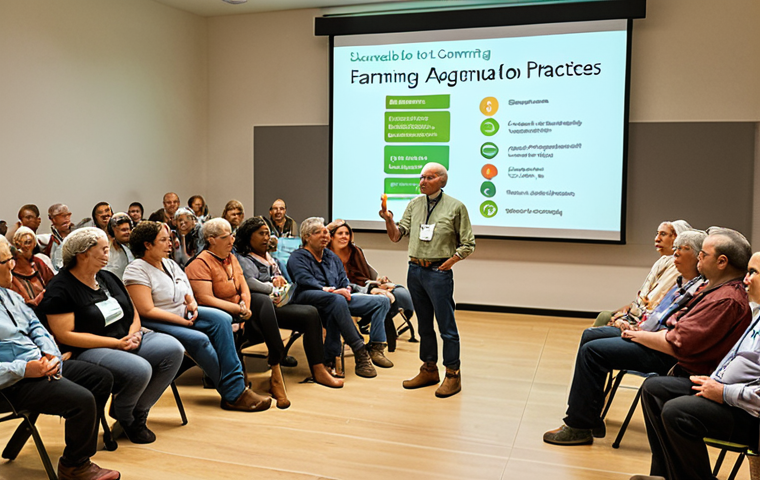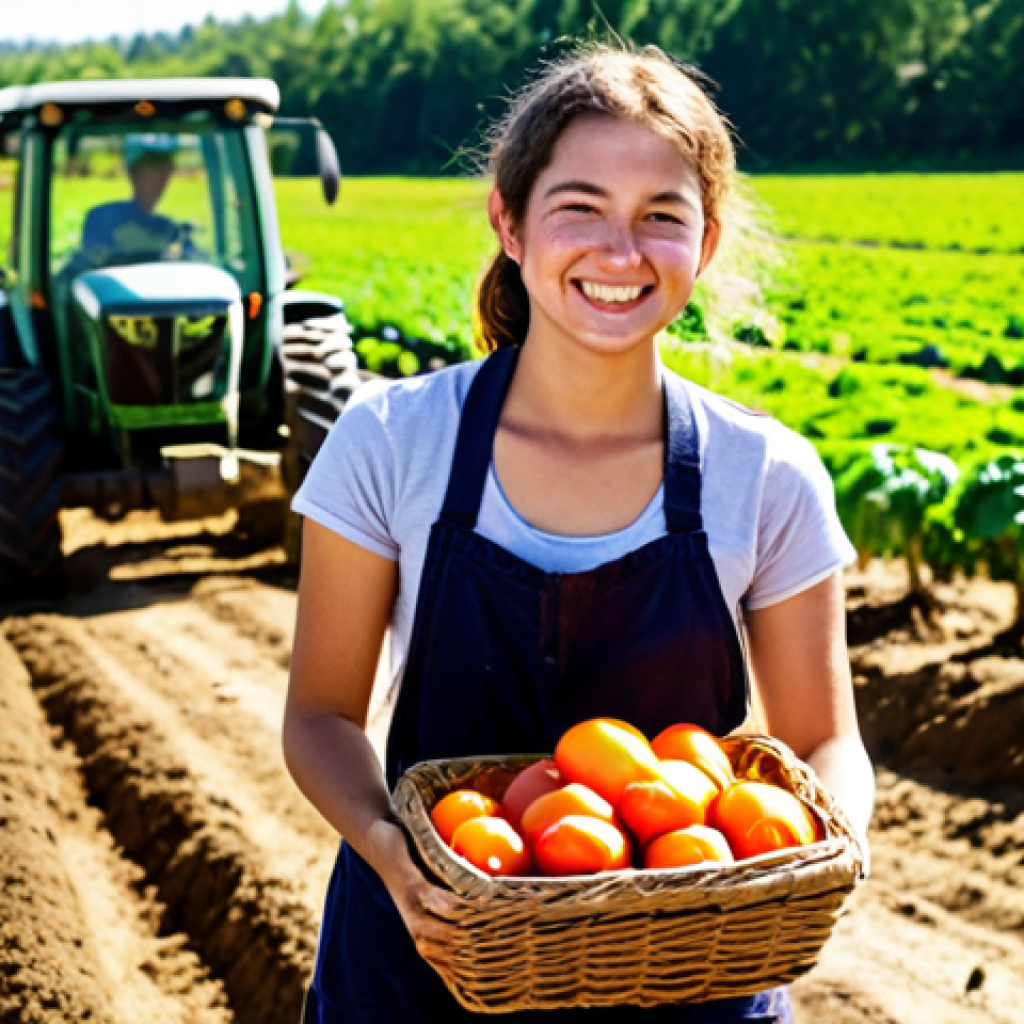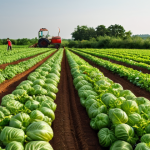Embarking on a career in organic farming? It’s more than just a job; it’s a lifestyle deeply connected to nature and sustainability. From my own experiences, I’ve seen the rewarding journey of nurturing the land and reaping the benefits of healthy, chemical-free produce.
The demand for organic products is surging, driven by health-conscious consumers and a growing awareness of environmental issues. Experts predict even further growth in the coming years, making it a promising field for those passionate about agriculture and the planet.
Let’s delve deeper and uncover the essentials for cultivating a successful career in organic farming below.
Embarking on a career in organic farming? It’s more than just a job; it’s a lifestyle deeply connected to nature and sustainability. From my own experiences, I’ve seen the rewarding journey of nurturing the land and reaping the benefits of healthy, chemical-free produce.
The demand for organic products is surging, driven by health-conscious consumers and a growing awareness of environmental issues. Experts predict even further growth in the coming years, making it a promising field for those passionate about agriculture and the planet.
Let’s delve deeper and uncover the essentials for cultivating a successful career in organic farming below.
Gaining Practical Experience Through Internships and Volunteering

First off, get your hands dirty! There’s no substitute for real-world experience. I spent a summer interning at a local organic farm, and it was the most valuable thing I could have done.
I learned about everything from soil preparation to pest control, and I even got to drive a tractor (badly, at first!). Look for internships or volunteer opportunities at established organic farms in your area.
This will give you a firsthand look at the day-to-day operations, the challenges, and the rewards of organic farming. It’s also a great way to network and make connections in the industry.
Plus, you’ll get a feel for whether or not this lifestyle is truly for you. The beauty of volunteering and internships is that they provide a no-pressure environment to learn and grow, making mistakes without high stakes.
I remember one time, I accidentally mixed up two different seed varieties and ended up with a row of hybrid tomatoes that were… interesting, to say the least.
It was a learning experience, and thankfully, my supervisor was understanding and showed me the proper way to label and organize seeds. These experiences are invaluable and will set you apart when you start looking for paid positions.
1. Finding the Right Farm for You
Not all organic farms are created equal. Some specialize in certain crops, while others focus on livestock or a mix of both. Think about what you’re passionate about – do you love the idea of growing rows of vibrant vegetables, or are you more interested in raising happy, healthy animals?
Research different farms in your area and see what aligns with your interests and goals. Don’t be afraid to reach out and ask questions about their practices, their philosophy, and what they look for in interns or volunteers.
This is your chance to find a farm that’s a good fit for you, where you can learn and grow in a supportive environment.
2. Maximizing Your Learning Experience
Once you’ve landed an internship or volunteer position, make the most of it! Be proactive, ask questions, and show a willingness to learn. Don’t be afraid to get your hands dirty – literally!
Organic farming can be physically demanding, but it’s also incredibly rewarding. Take the time to observe the farmers and other workers, and learn from their experience.
Pay attention to the details, from the way they prepare the soil to the way they harvest the crops. And most importantly, be open to new ideas and techniques.
Organic farming is constantly evolving, and there’s always something new to learn.
Pursuing Formal Education in Sustainable Agriculture
While practical experience is crucial, formal education can provide you with a solid foundation in the principles of sustainable agriculture. I initially thought I could just learn everything on the job, but after a year of working on a farm, I realized I needed a more in-depth understanding of the science behind organic farming.
That’s why I decided to go back to school and get a degree in sustainable agriculture. It was one of the best decisions I ever made. I learned about soil science, plant pathology, pest management, and even agricultural economics.
This knowledge gave me a whole new perspective on organic farming and helped me to become a more effective and knowledgeable farmer. Several universities and colleges now offer degree programs in sustainable agriculture, organic farming, or related fields.
These programs typically cover topics such as soil science, crop production, pest management, and farm management.
1. Choosing the Right Program
When selecting a program, consider your interests and career goals. Do you want to focus on crop production, livestock management, or a combination of both?
Do you want to work on a small-scale farm, a large-scale operation, or in a research or educational setting? Look for programs that offer hands-on learning opportunities, such as internships, farm visits, and research projects.
Also, consider the faculty and their expertise. Are they experienced farmers, researchers, or educators? Do they have a passion for sustainable agriculture?
2. Gaining Specialized Knowledge
In addition to a general degree in sustainable agriculture, you may want to consider specializing in a particular area, such as organic crop production, permaculture, or biodynamic farming.
These specialized programs can provide you with in-depth knowledge and skills in a specific area of organic farming. They can also help you to stand out from the crowd when you’re looking for a job.
For example, a permaculture certification can demonstrate your expertise in designing and implementing sustainable agricultural systems.
Networking and Building Connections in the Organic Farming Community
The organic farming community is a tight-knit group of passionate individuals who are committed to sustainable agriculture. Building connections with other farmers, researchers, and educators can be invaluable to your career.
I’ve found that the organic farming community is incredibly supportive and willing to share their knowledge and experience. I’ve learned so much from other farmers over the years, and I’ve also been able to help others by sharing my own experiences.
Attending conferences, workshops, and farm tours is a great way to meet people in the industry. Joining professional organizations, such as the Organic Farmers Association, can also help you to connect with other farmers and stay up-to-date on the latest trends and issues.
Don’t be afraid to reach out to people you admire and ask for advice. Most farmers are happy to share their knowledge and help others succeed.
1. Attending Industry Events and Conferences
Industry events and conferences provide opportunities to learn about the latest trends and innovations in organic farming. They also offer a chance to network with other farmers, researchers, and educators.
Look for events that focus on organic farming, sustainable agriculture, or related topics. These events often feature workshops, presentations, and farm tours.
Be sure to bring your business cards and be prepared to introduce yourself to others.
2. Joining Professional Organizations
Professional organizations, such as the Organic Farmers Association, can help you to connect with other farmers and stay up-to-date on the latest trends and issues.
These organizations often offer resources such as newsletters, webinars, and online forums. They may also offer opportunities for professional development and networking.
Joining a professional organization can be a great way to stay connected to the organic farming community and advance your career.
Understanding the Business Aspects of Organic Farming
While a passion for sustainable agriculture is essential, it’s also important to understand the business aspects of organic farming. Running a successful organic farm requires a solid understanding of financial management, marketing, and sales.
I’ve seen many passionate farmers struggle because they didn’t have the business skills to manage their farms effectively. That’s why it’s important to learn about topics such as budgeting, record keeping, and marketing.
Consider taking business courses or workshops, or seeking advice from experienced farmers or business advisors. Creating a business plan can help you to define your goals, develop a marketing strategy, and secure funding.
1. Developing a Business Plan
A business plan is a written document that outlines your goals, strategies, and financial projections for your farm. It should include information such as your target market, your marketing strategy, your production plan, and your financial projections.
A well-developed business plan can help you to clarify your vision, identify potential challenges, and secure funding from lenders or investors. It can also serve as a roadmap for your farm’s success.
2. Financial Management and Budgeting
Effective financial management is crucial for the success of any organic farm. You need to track your income and expenses, manage your cash flow, and create a budget.
Consider using accounting software or hiring a bookkeeper to help you manage your finances. A budget can help you to plan your spending, track your progress, and identify areas where you can save money.
It can also help you to make informed decisions about investments and expansions. Here’s a simple table summarizing key aspects of different roles in organic farming:
| Role | Responsibilities | Skills Needed | Typical Salary Range |
|---|---|---|---|
| Farmhand | Planting, harvesting, weeding, animal care | Physical stamina, attention to detail, basic knowledge of farming | $25,000 – $35,000 |
| Farm Manager | Overseeing daily operations, managing staff, crop planning | Leadership, organizational skills, in-depth farming knowledge | $45,000 – $65,000 |
| Agricultural Consultant | Providing advice on organic farming practices, soil health, pest control | Expert knowledge, communication skills, problem-solving | $55,000 – $80,000 |
| Organic Inspector | Certifying farms as organic, ensuring compliance with regulations | Knowledge of organic standards, attention to detail, integrity | $40,000 – $60,000 |
Specializing in a Niche Area of Organic Farming
The world of organic farming is incredibly diverse. From crop production to animal husbandry, from education to advocacy, there are countless ways to make a difference.
By specializing in a niche area, you can develop expertise and become a valuable asset to the organic farming community. I know a farmer who focuses solely on growing heirloom tomatoes, and he’s become a local celebrity for his delicious and unique varieties.
Another farmer I know specializes in beekeeping and honey production, and she’s become an expert in sustainable beekeeping practices. Think about what you’re passionate about and what skills you have, and then consider how you can combine those to create a unique niche for yourself.
1. Identifying Your Passion and Skills
What are you most passionate about in the world of organic farming? Do you love growing vegetables, raising animals, or educating others about sustainable agriculture?
What skills do you have that you can leverage to create a niche for yourself? Are you a good communicator, a skilled gardener, or a knowledgeable researcher?
By identifying your passion and skills, you can find a niche that’s both fulfilling and rewarding.
2. Exploring Different Niche Areas
There are many different niche areas within organic farming to explore. You could specialize in a particular crop, such as heirloom tomatoes, mushrooms, or herbs.
You could specialize in a particular animal, such as bees, chickens, or goats. You could specialize in a particular farming technique, such as permaculture, biodynamic farming, or agroforestry.
Or you could specialize in a particular area of education or advocacy, such as farm-to-school programs, community gardens, or policy advocacy. The possibilities are endless!
Staying Up-to-Date on the Latest Trends and Regulations
The world of organic farming is constantly evolving. New research, new technologies, and new regulations are constantly changing the way we farm. That’s why it’s important to stay up-to-date on the latest trends and regulations.
Subscribe to industry newsletters, attend conferences and workshops, and follow relevant organizations on social media. I make it a point to read at least one article or research paper related to organic farming every week.
It helps me to stay informed about the latest developments and to improve my farming practices. Also, be sure to stay informed about the regulations governing organic farming in your area.
These regulations can change from time to time, so it’s important to stay on top of them.
1. Subscribing to Industry Publications
Industry publications, such as magazines, newsletters, and blogs, can provide you with valuable information about the latest trends and regulations in organic farming.
These publications often feature articles, interviews, and research reports. They can also provide you with information about upcoming events and conferences.
2. Following Relevant Organizations and Influencers
Following relevant organizations and influencers on social media can help you to stay up-to-date on the latest news and trends in organic farming. These organizations and influencers often share articles, videos, and other content related to organic farming.
They can also provide you with insights into the latest research and regulations. These steps will equip you with the knowledge, experience, and connections needed to thrive in the dynamic world of organic farming.
Remember, it’s a journey of continuous learning and adaptation, but the rewards of contributing to a healthier planet and a more sustainable food system are immeasurable.
Gaining Practical Experience Through Internships and Volunteering
First off, get your hands dirty! There’s no substitute for real-world experience. I spent a summer interning at a local organic farm, and it was the most valuable thing I could have done. I learned about everything from soil preparation to pest control, and I even got to drive a tractor (badly, at first!). Look for internships or volunteer opportunities at established organic farms in your area. This will give you a firsthand look at the day-to-day operations, the challenges, and the rewards of organic farming. It’s also a great way to network and make connections in the industry. Plus, you’ll get a feel for whether or not this lifestyle is truly for you. The beauty of volunteering and internships is that they provide a no-pressure environment to learn and grow, making mistakes without high stakes. I remember one time, I accidentally mixed up two different seed varieties and ended up with a row of hybrid tomatoes that were… interesting, to say the least. It was a learning experience, and thankfully, my supervisor was understanding and showed me the proper way to label and organize seeds. These experiences are invaluable and will set you apart when you start looking for paid positions.
1. Finding the Right Farm for You
Not all organic farms are created equal. Some specialize in certain crops, while others focus on livestock or a mix of both. Think about what you’re passionate about – do you love the idea of growing rows of vibrant vegetables, or are you more interested in raising happy, healthy animals? Research different farms in your area and see what aligns with your interests and goals. Don’t be afraid to reach out and ask questions about their practices, their philosophy, and what they look for in interns or volunteers. This is your chance to find a farm that’s a good fit for you, where you can learn and grow in a supportive environment.
2. Maximizing Your Learning Experience
Once you’ve landed an internship or volunteer position, make the most of it! Be proactive, ask questions, and show a willingness to learn. Don’t be afraid to get your hands dirty – literally! Organic farming can be physically demanding, but it’s also incredibly rewarding. Take the time to observe the farmers and other workers, and learn from their experience. Pay attention to the details, from the way they prepare the soil to the way they harvest the crops. And most importantly, be open to new ideas and techniques. Organic farming is constantly evolving, and there’s always something new to learn.
Pursuing Formal Education in Sustainable Agriculture
While practical experience is crucial, formal education can provide you with a solid foundation in the principles of sustainable agriculture. I initially thought I could just learn everything on the job, but after a year of working on a farm, I realized I needed a more in-depth understanding of the science behind organic farming. That’s why I decided to go back to school and get a degree in sustainable agriculture. It was one of the best decisions I ever made. I learned about soil science, plant pathology, pest management, and even agricultural economics. This knowledge gave me a whole new perspective on organic farming and helped me to become a more effective and knowledgeable farmer. Several universities and colleges now offer degree programs in sustainable agriculture, organic farming, or related fields. These programs typically cover topics such as soil science, crop production, pest management, and farm management.
1. Choosing the Right Program
When selecting a program, consider your interests and career goals. Do you want to focus on crop production, livestock management, or a combination of both? Do you want to work on a small-scale farm, a large-scale operation, or in a research or educational setting? Look for programs that offer hands-on learning opportunities, such as internships, farm visits, and research projects. Also, consider the faculty and their expertise. Are they experienced farmers, researchers, or educators? Do they have a passion for sustainable agriculture?
2. Gaining Specialized Knowledge
In addition to a general degree in sustainable agriculture, you may want to consider specializing in a particular area, such as organic crop production, permaculture, or biodynamic farming. These specialized programs can provide you with in-depth knowledge and skills in a specific area of organic farming. They can also help you to stand out from the crowd when you’re looking for a job. For example, a permaculture certification can demonstrate your expertise in designing and implementing sustainable agricultural systems.
Networking and Building Connections in the Organic Farming Community
The organic farming community is a tight-knit group of passionate individuals who are committed to sustainable agriculture. Building connections with other farmers, researchers, and educators can be invaluable to your career. I’ve found that the organic farming community is incredibly supportive and willing to share their knowledge and experience. I’ve learned so much from other farmers over the years, and I’ve also been able to help others by sharing my own experiences. Attending conferences, workshops, and farm tours is a great way to meet people in the industry. Joining professional organizations, such as the Organic Farmers Association, can also help you to connect with other farmers and stay up-to-date on the latest trends and issues. Don’t be afraid to reach out to people you admire and ask for advice. Most farmers are happy to share their knowledge and help others succeed.
1. Attending Industry Events and Conferences
Industry events and conferences provide opportunities to learn about the latest trends and innovations in organic farming. They also offer a chance to network with other farmers, researchers, and educators. Look for events that focus on organic farming, sustainable agriculture, or related topics. These events often feature workshops, presentations, and farm tours. Be sure to bring your business cards and be prepared to introduce yourself to others.
2. Joining Professional Organizations
Professional organizations, such as the Organic Farmers Association, can help you to connect with other farmers and stay up-to-date on the latest trends and issues. These organizations often offer resources such as newsletters, webinars, and online forums. They may also offer opportunities for professional development and networking. Joining a professional organization can be a great way to stay connected to the organic farming community and advance your career.
Understanding the Business Aspects of Organic Farming
While a passion for sustainable agriculture is essential, it’s also important to understand the business aspects of organic farming. Running a successful organic farm requires a solid understanding of financial management, marketing, and sales. I’ve seen many passionate farmers struggle because they didn’t have the business skills to manage their farms effectively. That’s why it’s important to learn about topics such as budgeting, record keeping, and marketing. Consider taking business courses or workshops, or seeking advice from experienced farmers or business advisors. Creating a business plan can help you to define your goals, develop a marketing strategy, and secure funding.
1. Developing a Business Plan
A business plan is a written document that outlines your goals, strategies, and financial projections for your farm. It should include information such as your target market, your marketing strategy, your production plan, and your financial projections. A well-developed business plan can help you to clarify your vision, identify potential challenges, and secure funding from lenders or investors. It can also serve as a roadmap for your farm’s success.
2. Financial Management and Budgeting
Effective financial management is crucial for the success of any organic farm. You need to track your income and expenses, manage your cash flow, and create a budget. Consider using accounting software or hiring a bookkeeper to help you manage your finances. A budget can help you to plan your spending, track your progress, and identify areas where you can save money. It can also help you to make informed decisions about investments and expansions.
Here’s a simple table summarizing key aspects of different roles in organic farming:
| Role | Responsibilities | Skills Needed | Typical Salary Range |
|---|---|---|---|
| Farmhand | Planting, harvesting, weeding, animal care | Physical stamina, attention to detail, basic knowledge of farming | $25,000 – $35,000 |
| Farm Manager | Overseeing daily operations, managing staff, crop planning | Leadership, organizational skills, in-depth farming knowledge | $45,000 – $65,000 |
| Agricultural Consultant | Providing advice on organic farming practices, soil health, pest control | Expert knowledge, communication skills, problem-solving | $55,000 – $80,000 |
| Organic Inspector | Certifying farms as organic, ensuring compliance with regulations | Knowledge of organic standards, attention to detail, integrity | $40,000 – $60,000 |
Specializing in a Niche Area of Organic Farming
The world of organic farming is incredibly diverse. From crop production to animal husbandry, from education to advocacy, there are countless ways to make a difference. By specializing in a niche area, you can develop expertise and become a valuable asset to the organic farming community. I know a farmer who focuses solely on growing heirloom tomatoes, and he’s become a local celebrity for his delicious and unique varieties. Another farmer I know specializes in beekeeping and honey production, and she’s become an expert in sustainable beekeeping practices. Think about what you’re passionate about and what skills you have, and then consider how you can combine those to create a unique niche for yourself.
1. Identifying Your Passion and Skills
What are you most passionate about in the world of organic farming? Do you love growing vegetables, raising animals, or educating others about sustainable agriculture? What skills do you have that you can leverage to create a niche for yourself? Are you a good communicator, a skilled gardener, or a knowledgeable researcher? By identifying your passion and skills, you can find a niche that’s both fulfilling and rewarding.
2. Exploring Different Niche Areas
There are many different niche areas within organic farming to explore. You could specialize in a particular crop, such as heirloom tomatoes, mushrooms, or herbs. You could specialize in a particular animal, such as bees, chickens, or goats. You could specialize in a particular farming technique, such as permaculture, biodynamic farming, or agroforestry. Or you could specialize in a particular area of education or advocacy, such as farm-to-school programs, community gardens, or policy advocacy. The possibilities are endless!
Staying Up-to-Date on the Latest Trends and Regulations
The world of organic farming is constantly evolving. New research, new technologies, and new regulations are constantly changing the way we farm. That’s why it’s important to stay up-to-date on the latest trends and regulations. Subscribe to industry newsletters, attend conferences and workshops, and follow relevant organizations on social media. I make it a point to read at least one article or research paper related to organic farming every week. It helps me to stay informed about the latest developments and to improve my farming practices. Also, be sure to stay informed about the regulations governing organic farming in your area. These regulations can change from time to time, so it’s important to stay on top of them.
1. Subscribing to Industry Publications
Industry publications, such as magazines, newsletters, and blogs, can provide you with valuable information about the latest trends and regulations in organic farming. These publications often feature articles, interviews, and research reports. They can also provide you with information about upcoming events and conferences.
2. Following Relevant Organizations and Influencers
Following relevant organizations and influencers on social media can help you to stay up-to-date on the latest news and trends in organic farming. These organizations and influencers often share articles, videos, and other content related to organic farming. They can also provide you with insights into the latest research and regulations.
In Conclusion
Embarking on a career in organic farming is a deeply rewarding endeavor, blending passion with purpose. By embracing hands-on experience, pursuing education, and building a robust network, you’ll be well-equipped to thrive. Remember, success in this field hinges on continuous learning and adaptation. So, roll up your sleeves, connect with the community, and cultivate your path to a sustainable future. The land awaits, and the possibilities are endless.
Useful Information
1. Soil testing is crucial for determining nutrient levels and pH balance. Contact your local agricultural extension office for affordable testing services.
2. Composting is an excellent way to recycle organic waste and improve soil health. Start a compost pile or bin using kitchen scraps, yard waste, and other organic materials.
3. Crop rotation is a key strategy for preventing pest and disease problems. Plan your crop rotations to diversify your plantings and disrupt pest life cycles.
4. Beneficial insects, like ladybugs and lacewings, can help control pests naturally. Attract these insects to your farm by planting flowers and herbs that provide food and shelter.
5. USDA Organic certification is essential for selling your products as organic. Familiarize yourself with the certification process and requirements.
Key Takeaways
• Gain practical experience through internships and volunteering.
• Pursue formal education in sustainable agriculture.
• Network and build connections in the organic farming community.
• Understand the business aspects of organic farming.
• Stay up-to-date on the latest trends and regulations.
Frequently Asked Questions (FAQ) 📖
Q: I’m interested in transitioning to organic farming, but I have no prior experience. Where do I even begin?
A: That’s a fantastic question! I totally get the feeling – it can seem overwhelming at first. Honestly, the best thing you can do is immerse yourself in the world of organic farming.
Start by volunteering on an organic farm; WWOOF (World Wide Opportunities on Organic Farms) is a great resource for finding placements. Getting your hands dirty and seeing the day-to-day realities firsthand is invaluable.
Read up on organic farming practices – the Rodale Institute is a wealth of information. Consider taking a course or workshop to learn about soil health, pest management, and crop rotation.
Don’t be afraid to ask questions; organic farmers are usually very passionate and willing to share their knowledge. Think of it like learning a new language; you start with the basics and build your skills over time.
Q: What are the biggest challenges I’m likely to face when starting out in organic farming, and how can I prepare for them?
A: Oh boy, where do I even begin? Seriously though, it’s not all sunshine and rainbows! One of the biggest hurdles is weed control without synthetic herbicides.
It’s a constant battle! Invest in good tools, learn about cover cropping, and be prepared to spend a lot of time hoeing! Another biggie is pest management.
Organic methods require a different mindset; you’re working with nature, not against it. Research beneficial insects, learn about natural pest repellents, and understand your local ecosystem.
Market access can also be tricky. Developing relationships with local restaurants, farmers markets, or even starting a CSA (Community Supported Agriculture) program can give you a direct route to consumers.
From what I’ve seen, having a solid business plan and being financially prepared for some lean years in the beginning is extremely important.
Q: What kind of salary can I realistically expect in the early years of my organic farming career? Is it enough to live on?
A: Let’s be honest, you’re probably not going to get rich quick in organic farming, especially at the beginning. Early on, you might be looking at something closer to a living wage, depending on your location and the scale of the operation.
Entry-level positions on farms might pay around $15-$20 an hour. If you’re running your own small farm, your income can fluctuate quite a bit depending on the season, crop yields, and market prices.
I remember one year my friend barely broke even after a particularly bad drought! That being said, the income potential definitely increases as you gain experience and build your farm.
Consider diversifying your income streams – maybe you can offer farm tours, workshops, or sell value-added products like jams or pickles. The key is to be realistic, frugal, and passionate.
If you’re doing it purely for the money, you’re likely to burn out quickly. But if you love the land and are dedicated to sustainable agriculture, the rewards, both tangible and intangible, can be immensely satisfying.
📚 References
Wikipedia Encyclopedia
구글 검색 결과
구글 검색 결과
구글 검색 결과
구글 검색 결과
구글 검색 결과



